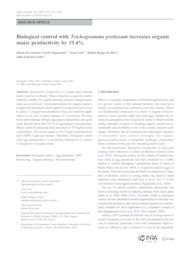Biological control with Trichogramma pretiosum increases organic maize productivity by 19.4%.
Biological control with Trichogramma pretiosum increases organic maize productivity by 19.4%.
Author(s): FIGUEIREDO, M. de L. C.; CRUZ, I.; SILVA, R. B. da; FOSTER, J. E.
Summary: Spodoptera frugiperda is a major pest causing maize yield loss in Brazil. There is therefore a need for control methods, notably for organic farming because classical pesticides are not allowed.A potential solution for organicmaize is to apply the biological control agent Trichogramma pretiosum to reduce S. frugiperda populations. Here, we tested the application of one, two, or three releases of T. pretiosum. We measured plant damage ratings, egg masses parasitized, and grain yield. Results show that 79.2 % of egg masses were parasited. Maize yields for parasited plots increased of 701 kg/ha versus control plots. This result equals a 19.4 % gain of productivity and US$96.5 gain per hectare. Therefore, biological control with egg parasitoids is a promising alternative to control S. frugiperda in organic maize
Publication year: 2015
Types of publication: Journal article
Unit: Embrapa Maize & Sorghum
Observation
Some of Embrapa's publications are published as ePub files. To read them, use or download one of the following free software options to your computer or mobile device. Android: Google Play Books; IOS: iBooks; Windows and Linux: Calibre.
Access other publications
Access the Agricultural Research Database (BDPA) to consult Embrapa's full library collection and records.
Visit Embrapa Bookstore to purchase books and other publications sold by Embrapa.

